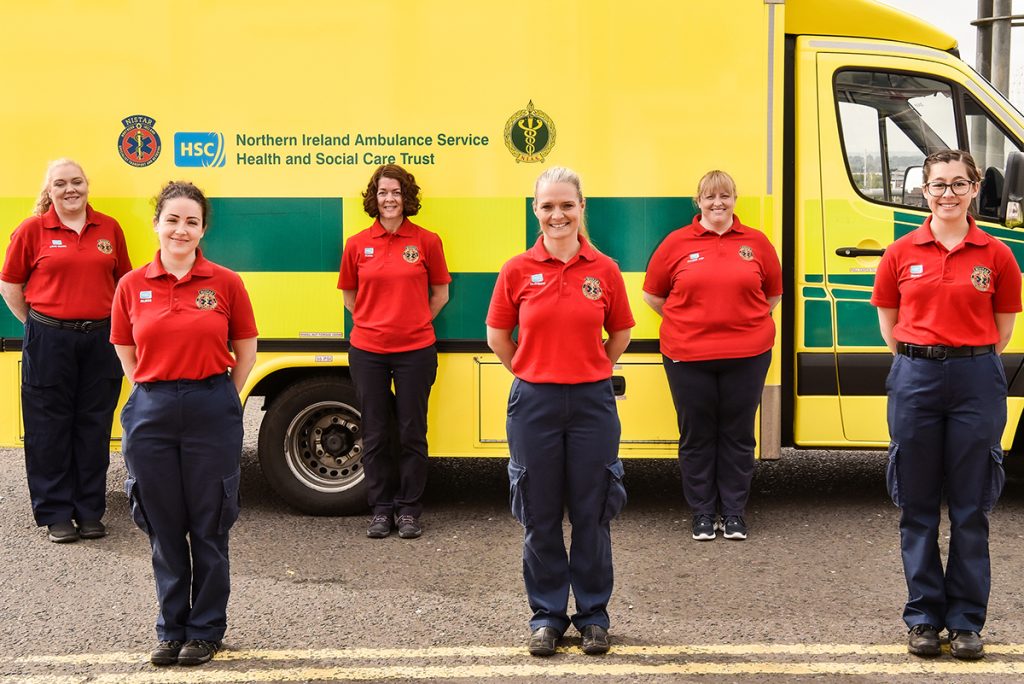
back row – Emma Thompson, Linda McCready, Lynsey Freeburn
The first dedicated paediatric nurse led transport service of its kind in the UK and Ireland, which has helped facilitate early discharge and prevent unnecessary overnight hospital stays for patients from Northern Ireland having surgery in the all-Ireland surgical unit at CHI Crumlin, won second prize at the 2021 European Association of Hospital Managers (EAHM) Innovation Awards. Project member, Emma Thompson explains how it works.
The Northern Ireland Specialist Transport and Retrieval (NISTAR) introduction of a dedicated Nurse led transport team project was led by, Lynsey Freeburn and myself from the Royal Belfast Hospital for Sick Children (RBHSC). Cara Barbour, Linda McCready, Vicky Harte, Natasha Lee later joined as the clinical team to deliver the service.
Since 2015, Northern Ireland children in need of cardiac treatment have been able to access life-changing surgery in (CHI Crumlin), through the All-Island Congenital Heart Disease (CHD) Network. This represented a huge step-up in patient welfare and removal of the stress associated with having to travel to the UK mainland for surgery for children and their families.
In the first year of service, the Nurse led transport team has transferred 343 patients between Northern Ireland the Republic of Ireland, far exceeding initial expectations.
The development of the All-Island CHD Network resulted in a significant increase in the number of neonatal and paediatric cross-border transfers being carried out by the Northern Ireland Specialist Transport & Retrieval team, particularly between the Royal Belfast Hospital for Sick Children, Belfast and Children’s Health Ireland (CHI), Dublin. The majority of transfers were carried out by the NISTAR paediatric critical care team or the Neonatal NISTAR team, which significantly affected their ability to deliver their core-mandated work.
In my role as NISTAR Lead Nurse, I recognised that a dedicated specialist nurse led team could safely carry out these transfers. In doing so, they could provide a positive patient experience in addition to assisting with patient flow and bed availability through more timely transfers; transfers were often delayed due to the unavailability of consultant intensivists and neonatologists because of local service demands.
The new concept for the delivery of the paediatric transfer service was shared with the paediatric and neonatal clinical teams who worked together to identify neonates and children that could be safely transferred by a specialist nursing team using an agreed set of criteria. There was a strong collective leadership approach to the implementation of this new service, with doctors, nurses, managers, administration staff, commissioners and children and families involved in the service design.
An initial workshop was held with representatives from the various district general hospitals, the All-Island CHD Network and the child health partnership. Medical colleagues were initially skeptical, but through the shared development of referral criteria for the nurse led service and the tenacity and perseverance of the NISTAR nursing team, soon bought in to the concept. A presentation was prepared and shared with stakeholders that outlined the vision and purpose of the service. This approach helped to ensure a smooth service implementation. Simulation Training, patient information leaflets, staff posters and a video helped to inform staff, children and their families about the new service.
Video Link: Nurse Led Transport Team | NISTAR (hscni.net)
Six months after implementation, the NISTAR Nurse led team visited the CHI cardiac team in Dublin to identify if there were any areas for improvement. Communication was highlighted and subsequently a daily morning conference call was set-up between NISTAR, CHI and RBHSC to discuss possible cross-border transfers to and from Dublin and Belfast.
3. Results
The NISTAR Paediatric nurse led transport team is the first dedicated nurse led transport service of its kind in the UK and Ireland. It has helped to facilitate early discharge and prevent unnecessary overnight stays in hospital, benefiting both the patient and patient flow.
It had helped to ensure that specialist intensive care consultants are not unnecessarily involved in patient transfers and reducing the available workforce to paediatric and neonatal services. Because the intensive care team was now spending less time on cross-border transfers, this resulted in reduced delays to the regional transfer of critically ill neonates within Northern Ireland. The daily morning conference call had expedited the transfer of children and improved communication between RBHSC and CHI.
Service user feedback was actively sought from children and their families. The feedback received included that the trolley was uncomfortable, the journey was long and the ambulance was boring. This led to the purchase of additional equipment including an extra thick mattress to make the journey more comfortable for patients, a tablet device for videos and, following a meeting with the play therapist, sensory equipment including lights and toys.
In the first year of service, the Nurse led transport team has transferred 343 patients between Northern Ireland the Republic of Ireland, far exceeding initial expectations.
Since then, the team has been asked to share their referral criteria and standard operating procedures with other transport services in the UK and Ireland looking to implement a similar model. The NISTAR nursing team has also been approached by other children’s specialties, including Orthopedics and Palliative care, to develop a similar service for their patients also.
The team is hoping to add to their ambulance fleet with a dedicated children’s ambulance to continue to improve the patient experience and will actively seek service user involvement in this process.

